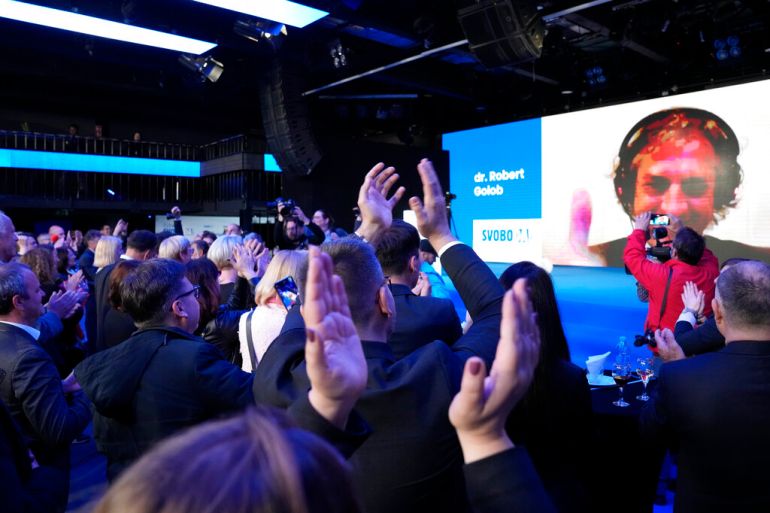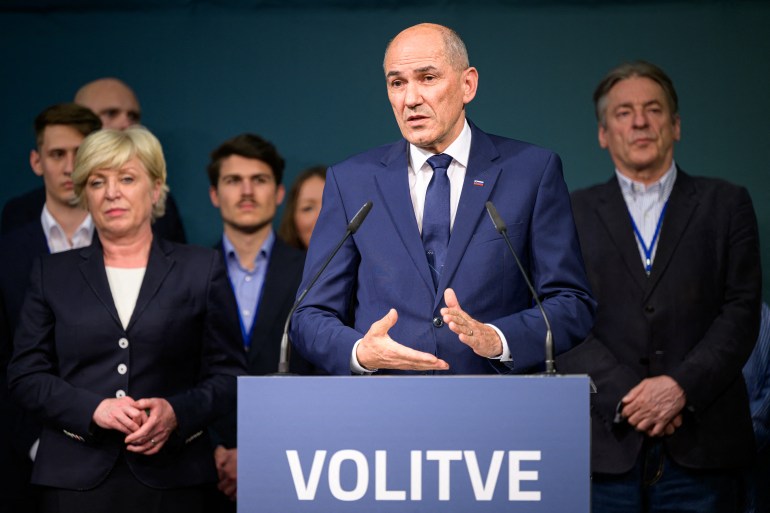Liberal opposition beats right-wing ruling party in Slovenia vote
Preliminary figures show opposition Freedom Movement party leading with 34.34 percent of the vote.

An opposition liberal party has convincingly scored an election victory in Slovenia, according to early official results, in a major defeat for populist Prime Minister Janez Jansa, who was accused of pushing the European Union country to the right.
Jansa, who had hoped to win a fourth term in office, conceded on Sunday that he had been defeated in the vote, but added that his Slovenian Democratic Party (SDS) party secured more votes than ever.
Keep reading
list of 4 itemsSlovenia votes in tight parliamentary elections
Polish, Czech and Slovenian PMs visit Kyiv in EU show of support
Slovenia suspends Johnson vaccine over death of 20-year-old
“The results are what they are. Congratulations to the relative winner,” Jansa said, addressing his supporters.
Official preliminary figures showed the Freedom Movement, a newcomer in the election led by Robert Golob, leading with 34.34 percent of the vote, far more than expected, while the SDS secured 23.83 percent, based on 98.20 percent of counted ballots.
That would give the Freedom Movement, which campaigned on a transition to green energy, an open society and the rule of law, 40 seats in the 90-seat parliament, and the SDS 28 seats.
The turnout in the vote, in which some 1.7 million people were eligible to cast their ballots in the EU and the NATO member country, was 68 percent, the election commission said. It was approximately 53 percent in 2018.
Al Jazeera’s Gasper Lubej, reporting from Ljubljana, said that the high turnout was a key factor in the result.
“This was supposed to be a tight race between Robert Golob of the Freedom Movement and Prime Minister Jansa, but Golob won in a landslide,” he said.
“One of the reasons is that Golob has a lot of new voters who did not go to the ballot box before,” he added.
He said that ahead of the elections, civil society campaigns worked hard to persuade people to go to the polls.

Coalition with left-wing expected
Freedom Movement, which was formed last year, is led by Golob, a former executive of a state-owned energy company that launched green energy projects.
In order to form a government, it is expected to form a coalition with the left-leaning Social Democrats and Left parties, which are currently set to have a combined12 seats in parliament.
Golob, 55, who is believed to have contracted COVID-19, thanked his celebrating supporters for the historical turnout via a video call.
“It does not mean that we are the unique ones, it means that people really want change,” he said.
“So today people are dancing but tomorrow is a new day. Tomorrow we start working hard to justify trust,” he also said.
“Our objective has been reached: a victory that will enable us to take the country back to freedom.”
Jansa, the 63-year-old populist who has clashed with Brussels over media freedoms and been accused by opponents of undermining democratic standards, which he has denied, said the new government will face many challenges and he hoped it will be up to the task.
Throughout the campaign, Golob has largely stayed clear of personally attacking his opponents.
The SDS went to great lengths to attack Golob, making much of his high salary, for example.
This led to Golob releasing his taxes for 2020, which showed his net annual salary to be 196,000 euros ($211,000).
The average monthly net wage in Slovenia in 2021 was 1,270 euros.